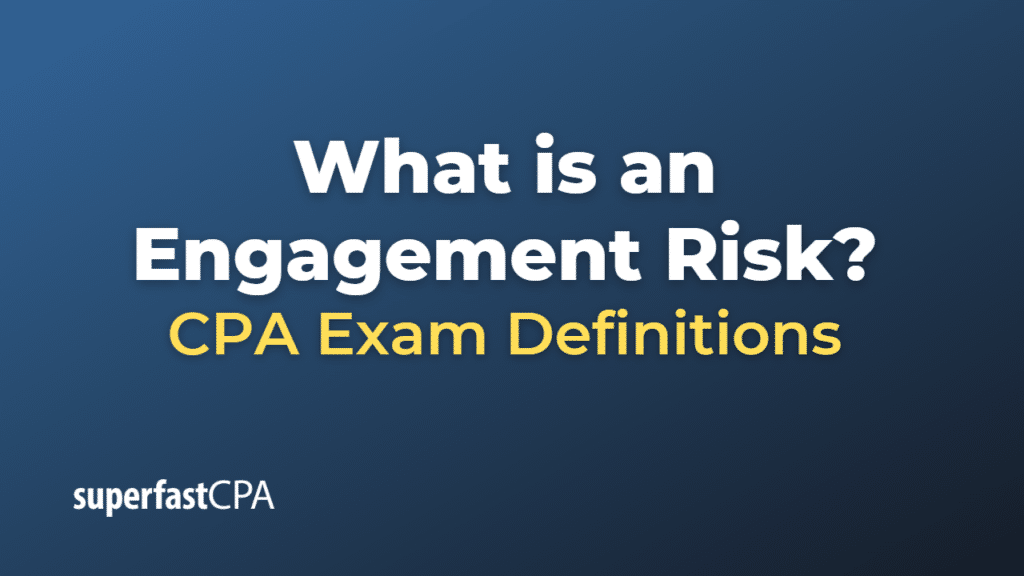Engagement Risk
Engagement risk refers to the potential risk or exposure that an auditor or consultant faces while providing service to a client. It involves the possibility of loss from events arising from a professional engagement, including potential harm to professional reputation, legal liability, or financial loss.
There are several types of engagement risk:
- Client’s Business Risk: This is the risk associated with the client’s business stability and industry. For example, if a client is operating in a highly competitive and volatile industry, the risk of business failure is higher. Auditors or consultants need to be aware of these risks as it could affect their service.
- Auditor’s Business Risk: This refers to the risk of loss resulting from the auditor’s association with a client. For example, if an auditor’s report is associated with a company that subsequently goes bankrupt or is involved in a scandal, the auditor’s reputation may suffer.
- Audit Risk: This is the risk that an auditor may issue an unmodified or “clean” opinion on financial statements that are materially misstated. Audit risk comprises inherent risk, control risk, and detection risk.
- Legal Liability Risk: This is the risk that an auditor or consultant could face legal action due to negligence, malpractice, or violation of laws and regulations during the course of the engagement.
To manage engagement risk, firms perform thorough client acceptance and continuance procedures to assess whether they should accept or continue a client relationship. These procedures help firms avoid clients with higher risks of unethical behavior, financial instability, or other factors that might increase engagement risk.
Professional standards and firm policies guide the nature and extent of these procedures. It also involves obtaining an understanding of the client’s business and industry, its management team, and the scope of services requested.
Example of Engagement Risk
Let’s say a public accounting firm, ABC Audit LLP, is approached by a large, high-profile technology company, TechNow Inc., requesting an audit of its financial statements.
The risks associated with this engagement might include:
- Client’s Business Risk: TechNow Inc. operates in a rapidly changing and highly competitive tech industry, which may present financial instability risks. If the company fails, ABC Audit LLP could face financial losses if fees are unpaid.
- Auditor’s Business Risk: If TechNow Inc. is discovered to be involved in a financial scandal after the audit, ABC Audit LLP’s reputation could suffer due to its association with the client.
- Audit Risk: The complexity of TechNow Inc.’s operations and the rapid pace of change in its industry increase the risk that ABC Audit LLP might overlook material misstatements in TechNow’s financial statements.
- Legal Liability Risk: If ABC Audit LLP fails to identify fraudulent activities or material misstatements during the audit, it could face legal actions from TechNow Inc.’s shareholders or regulatory bodies.
ABC Audit LLP would need to thoroughly evaluate these risks before accepting the engagement with TechNow Inc. They might decide to accept the engagement but increase the thoroughness of their audit procedures to mitigate the higher audit risk. Alternatively, if they determine the risks are too great, they might decline the engagement altogether.
These types of decisions are crucial for managing engagement risk and preserving the audit firm’s professional reputation and financial stability.













